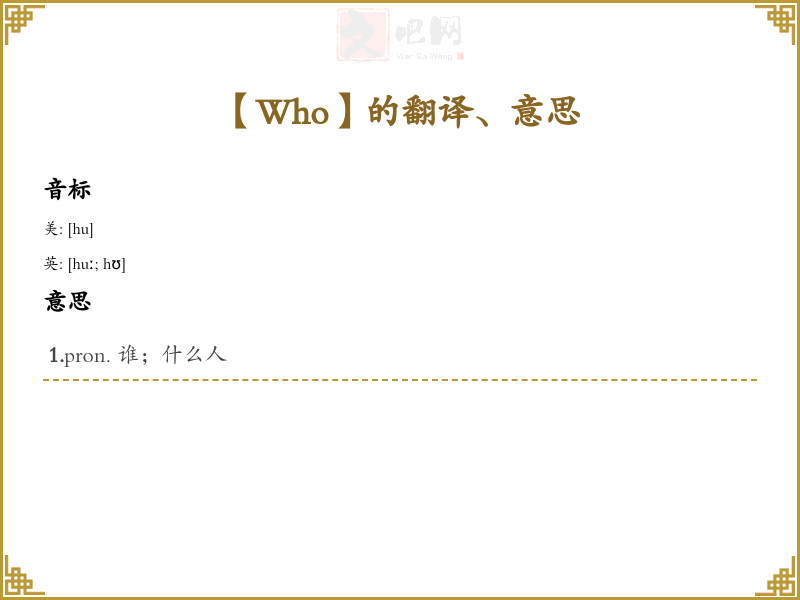【Who】的翻译、意思
时间: 2025-04-26 13:36:27
【Who】怎么读
美:[hu]
英:[huː; hʊ]
【Who】是什么意思、字义解释
1. pron. 谁;什么人
【Who】的详细解释
英文单词学*与分析:[Who]
1. 基本定义
- 字面意思:
- “Who” 是一个代词,用于询问或指代人。其字面含义为“谁”。
- 词性:
- 代词 (Pronoun)
2. 词源与起源
-
词源分析:
- “Who” 源于古英语“hwā”,与德语的“wer”和荷兰语的“wie”同源。它是一个问句代词,用于指代人。
-
历史背景:
- “Who” 的首次使用可以追溯到古英语时期,出现在古英语文学作品中,例如《贝奥武夫》(Beowulf),它展示了英语问句的早期形式。
-
课本:
- 在**的教材中,“who”通常出现在初中英语教材中,作为基本的疑问词。在牛津和美国的教材中,通常在小学阶段(如3-5年级)教授,作为基础语法的一部分。
3. 使用场景
-
正式与非正式语境:
- 在正式场合中,“who”用于正式的询问和学术讨论,例如:“Who is responsible for this project?”(谁负责这个项目?)
- 在非正式场合中,常用于日常对话,例如:“Who are you going to the party with?”(你和谁去派对?)
-
特殊场合:
- 在法律领域,常用于询问身份,例如:“Who is the plaintiff in this case?”(本案的原告是谁?)
- 在文学作品中,如莎士比亚的《哈姆雷特》,可见到“Who”在对话中的使用,增加了戏剧性和悬念。
4. 示例句子
- Who is your best friend?
(你最好的朋友是谁?) - Who wrote this book?
(谁写的这本书?) - Do you know who called me last night?
(你知道昨晚是谁给我打电话的吗?) - Who is responsible for this mistake?
(谁对这个错误负责?) - I wonder who will win the game.
(我想知道谁会赢得比赛。) *. Who are you?
(你是谁?) - Who did you meet at the conference?
(你在会议上遇见了谁?)
5. 同义词与反义词
-
同义词:
- “Who” 的同义词包括 “whom” (在正式语境中使用,作为宾格形式),但在现代英语中,使用频率逐渐下降。
-
反义词:
- “Who” 的反义词可以视为“what”,后者用于询问事物而非人,例如:“What is your name?”(你叫什么名字?)
. 学方法
-
词根记忆法:
- 理解“who”的词源和发展,帮助记忆其用法和含义。可以通过联想德语、荷兰语的同源词帮助记忆。
-
谐音联想记忆:
- 可以将“who”与中文“呼”联想在一起,想象在呼唤某人时会问“谁”来帮助记忆。
7. 关联词汇
- 高频词汇:
- 结合“who”使用的高频词汇包括:
- “is” (是)
- “are” (是)
- “did” (做)
- “called” (打电话)
- “met” (遇见)
这些词汇在构造句子时与“who”搭配使用频繁,帮助学生加深理解。
【Who】例句
1、[QUEST] You use who in questions when you ask about the name or identity of a person or group of people. 谁 (用于疑问句,询问姓名和身份)
-
例:Who's there?那是谁?
-
例:Who is the least popular man around here?谁是这里最不受欢迎的人?
-
例:"You reminded me of somebody."—"Who?"“你让我想起了一个人。”—“谁?”
2、[CONJ] You use who after certain words, especially verbs and adjectives, to introduce a clause where you talk about the identity of a person or a group of people. 谁 (用于特别是动词和形容词之后,引导从句,说明人的身份)
-
例:Police have not been able to find out who was responsible for the forgeries.警察还未能发现谁是那些伪造案的元凶。
-
例:I went over to start up a conversation, asking her who she knew at the party.我走过去攀谈起来,问她在聚会上都认识谁。
3、[PRON-REL] You use who at the beginning of a relative clause when specifying the person or group of people you are talking about or when giving more information about them. …的人 (用于关系从句句首,具体说明所谈论的人或给出更多相关信息)
-
例:There are those who eat out for a special occasion, or treat themselves.有那么一些在特殊日子到饭馆吃饭或犒劳自己的食客。
